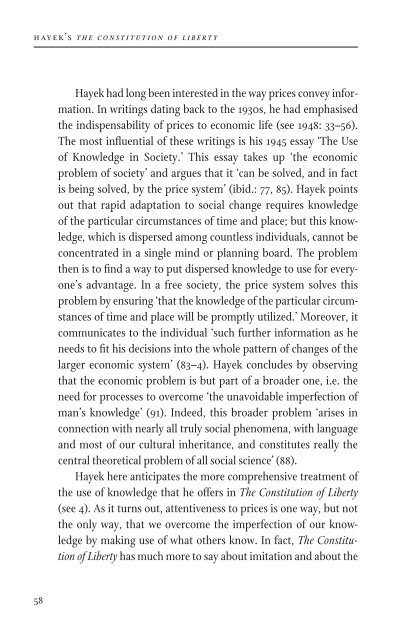Hayek's The Constitution of Liberty - Institute of Economic Affairs
Hayek's The Constitution of Liberty - Institute of Economic Affairs
Hayek's The Constitution of Liberty - Institute of Economic Affairs
You also want an ePaper? Increase the reach of your titles
YUMPU automatically turns print PDFs into web optimized ePapers that Google loves.
h ay e k ’ s t h e c o n s t i t u t i o n o f l i b e r t y<br />
t h e u s e a n d l i m i t s o f k n o w l e d g e<br />
Hayek had long been interested in the way prices convey information.<br />
In writings dating back to the 1930s, he had emphasised<br />
the indispensability <strong>of</strong> prices to economic life (see 1948: 33–56).<br />
<strong>The</strong> most influential <strong>of</strong> these writings is his 1945 essay ‘<strong>The</strong> Use<br />
<strong>of</strong> Knowledge in Society.’ This essay takes up ‘the economic<br />
problem <strong>of</strong> society’ and argues that it ‘can be solved, and in fact<br />
is being solved, by the price system’ (ibid.: 77, 85). Hayek points<br />
out that rapid adaptation to social change requires knowledge<br />
<strong>of</strong> the particular circumstances <strong>of</strong> time and place; but this knowledge,<br />
which is dispersed among countless individuals, cannot be<br />
concentrated in a single mind or planning board. <strong>The</strong> problem<br />
then is to find a way to put dispersed knowledge to use for everyone’s<br />
advantage. In a free society, the price system solves this<br />
problem by ensuring ‘that the knowledge <strong>of</strong> the particular circumstances<br />
<strong>of</strong> time and place will be promptly utilized.’ Moreover, it<br />
communicates to the individual ‘such further information as he<br />
needs to fit his decisions into the whole pattern <strong>of</strong> changes <strong>of</strong> the<br />
larger economic system’ (83–4). Hayek concludes by observing<br />
that the economic problem is but part <strong>of</strong> a broader one, i.e. the<br />
need for processes to overcome ‘the unavoidable imperfection <strong>of</strong><br />
man’s knowledge’ (91). Indeed, this broader problem ‘arises in<br />
connection with nearly all truly social phenomena, with language<br />
and most <strong>of</strong> our cultural inheritance, and constitutes really the<br />
central theoretical problem <strong>of</strong> all social science’ (88).<br />
Hayek here anticipates the more comprehensive treatment <strong>of</strong><br />
the use <strong>of</strong> knowledge that he <strong>of</strong>fers in <strong>The</strong> <strong>Constitution</strong> <strong>of</strong> <strong>Liberty</strong><br />
(see 4). As it turns out, attentiveness to prices is one way, but not<br />
the only way, that we overcome the imperfection <strong>of</strong> our knowledge<br />
by making use <strong>of</strong> what others know. In fact, <strong>The</strong> <strong>Constitution</strong><br />
<strong>of</strong> <strong>Liberty</strong> has much more to say about imitation and about the<br />
salience <strong>of</strong> moral approval and disapproval than about the price<br />
mechanism.<br />
In the 1945 essay, and sometimes also in <strong>The</strong> <strong>Constitution</strong> <strong>of</strong><br />
<strong>Liberty</strong>, Hayek employs this interesting formulation: the price<br />
system allows the individual to use knowledge that he does not<br />
possess; prices signal what countless individuals know <strong>of</strong> their<br />
own local situations; and I can use them in my own calculations<br />
without actually possessing the dispersed knowledge that they<br />
reflect. Whether this formulation would also cover our use <strong>of</strong><br />
traditional rules as well as instances <strong>of</strong> communication other than<br />
the price system (imitation, responding to signs <strong>of</strong> approval and<br />
disapproval) is uncertain. In conforming to tradition, arguably<br />
we would possess the rule either as a subconscious habit or as a<br />
conscious precept, although the reasons for the rule – the experiences<br />
from which it originated and through which it survived a<br />
long process <strong>of</strong> cultural selection – are unknown to us and therefore<br />
not in our possession. For the most part rules are followed<br />
blindly, without consideration <strong>of</strong> the reasons for them. <strong>The</strong> same<br />
may be largely true <strong>of</strong> our responses to approval and disapproval.<br />
Hayek does indicate, however, that as social evolution advances,<br />
imitation may come to have an element <strong>of</strong> deliberation and choice.<br />
Knowledge and social order<br />
In daily life we rely on rules and signs and take for granted the<br />
knowledge they make available for our use. By acting on such<br />
knowledge, we are able to carry out our own plans and to anticipate<br />
what to expect from others. All <strong>of</strong> this is to assume that the<br />
social world is orderly, but where does this order come from and<br />
what is its character?<br />
58<br />
59












